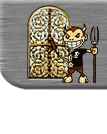





 |
 |
 |
||
 |
 |
 |
||
| |
|
|
|
|
| Home : Psychodynamic Module : Online Reading 1 | ||
Explicating Norms
|
 |
Fear of Failure When I first went into the classroom, one of my biggest fears and concerns, like everyone else, was classroom management. I felt I was least adept at handling power struggles. I had many dreams, nightmares, really, featuring the students getting the best of me and me looking foolish. Another recurring night torment had me standing in the front of the class trying to say something really important and no one would be listening. One vision was standing in the front of my Jr. High students waiting for them to get quiet (remember those sages who told us to stand at attention and wait until the students were ready to listen?) but the students just snicker, call me names from the back of the room and never stop talking and heckling. |
I wondered if I would lose control of myself like some of my teachers did and yell or call names and do damaging things to those in the class.
Sometimes I focused on future students. I hoped that I could meet their needs as some of my teachers met mine. I hated those times when teachers allowed one student to bully them, and I felt angry and cheated if the rest of the class were punished because one or two students were unruly. What if a student came to my class with real needs that I could have met, but instead, I put my own need for power or curriculum study before the pain of that child?
Who comes First? 
I soon learned the same lessons that other survivors in the classroom learned: if I put myself and my worries first, agonizing about my delivery, my rapport with the students, my perspective, my getting across the objectives and the material, I was losing the most crucial thing that I had - the relationship I could share with a student.
The way I can really do my best and give my best to the students is to move beyond personal thinking when I begin to teach, in service to the students, and in service to sharing the content they need. I can listen to them, really “hear” them and help them discover insights that will excite them and move them forward beyond me. I’ve tried many times to pass this information on to teachers. Certainly, as a teacher educator, I understand the importance of sharing these insights with future teachers. When I ponder on this and discuss how this feels with colleagues, I am often told that no one can pass the “magic” along, that it is a gift which is unique to a teaching personality. But I don’t believe that. I believe that it is the “self actualization” Maslow talks about.
Some of good teaching may be a gift, but for the most part, the special things teachers do in the classroom evolves from the models of outstanding teachers who touched our lives and who instinctively knew the importance of balance and self forgetfulness in the service of relationship. These process skills also evolve into a teaching style over time that matches my personality. Teaching ability is developmental -- it takes many years and many skills that finally become honed. And of course, there is one key ingredient of any great teacher--- the love for the students is dynamic and palpable. Each student knows the concern is unfeigned and that the concern about learning content comes through a genuineness of respect for each recipient.
Teaching is fulfilling
I want to share the excitement and the thrill that I receive in the classroom. I want to share the tools, the tricks of the trade, the nuances, and most of all, the philosophy of relationship. I want to allow the magic to happen over and over again, for all students, just as I hope, at the end of each class to feel that it occurred during that teaching session. I want it to be there for new teachers and to proliferate for those who stay in teaching.
I give credence to those who say that that good teaching is not reproducible in one sense. That is, the essence of the magic of teaching is relationship and the belief in the value and dignity of each person in the classroom. It includes an innate belief in self and a sense of personal responsibility to students, to self and to honoring the importance of passing on learning that is boundless - it is vital to be true to self - and it is just as vital to assist each student, regardless of where they are in self recognition, to be true to self and to the gifts which are inherently present.
Another of the great teaching gifts is the unfolding of each self into a sharing and caring human being. One person may not be in control of others. Self control is another magical gift - teacher in control of self, students taught to be in control of self. A true teacher is unwilling to hold the class hostage to a curriculum notion, or a final test score. No teacher holds a class hostage to one idea of education nor allows one student to hold the class hostage because of bitterness, lack of self discipline or lack of motivation. Instead, the use of powerful tools of selflessness and relationship with others becomes the essence of learning.
The less selfish and self centered I am, the more in tune I am with who I am without belaboring that point, the more successful I am in allowing others to be themselves. The more I admit my errors and miscalculations, the less likely I am to be judgmental or unrelenting of student failings, and the more open I am to share strengths and weaknesses with colleagues. This is a simple but timeless truth. It isn’t the type of concept that can be adopted by a district and in turn mandated for every teacher. It won’t work any better for an administrator to force a teacher to comply than it does for us to try to force students to learn something by threats or promises. If a teacher is not in tune with self or with this way of teaching, the ideas and concepts will be meaningless. If teachers wish to be person centered, if they want to combine the importance of content, their best instincts and the needs of the students in a mutually revolving relationship then this is an ideal classroom management style.
![]()
How it begins
These ideas adapt to differing personality styles and take on the flavor of the teacher using the ideas. Teaching relationship is adapted around the authenticity of the person and the things that make each person truly himself or herself. Gentle, quiet teachers need not learn to be harsh or assertive. Assertive, highly verbal people who like to joke and interact with high energy need not develop a gentle pseudo demeanor. Every person is called upon to be themselves at the highest functioning level of who they are when at their best. Thus begins the odyssey to great teaching -- for as each teacher claims and honors self, so can each student feel honored and each student in turn, will thrive in a learning environment that radiates unconditional acceptance, and in that safety, allows each person to learn -- to risk, to err, to challenge the limits -- and learn.
Do you have an opinion to share about this idea? You can collect another jewel by sharing it at the VCC or emailing the professor. Keep track of you tools and jewels, and vocalize your own ideas.
Collect a
![]() for completing this reading! Have fun!
for completing this reading! Have fun!
Go on to
Assignment 1
or
Go back to Text Reading
Course Created by J'Anne Ellsworth & Center for Technology Enhanced Learning
Copyright
© 2001 Northern Arizona University
ALL RIGHTS RESERVED
 |
 |
 |
 |
 |
|